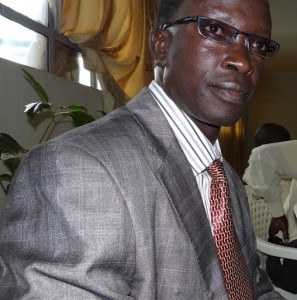Kenyan court to rule on ICC arrest warrant for Barasa
 Kenyan officials says a local court will make the final decision on whether or not to enforce the ICC’s arrest warrant for journalist Walter Barasa.
Kenyan officials says a local court will make the final decision on whether or not to enforce the ICC’s arrest warrant for journalist Walter Barasa.
Yesterday, Kenya’s Interior Minister Joseph Ole Lenku officially acknowledged receiving the ICC’s warrant. According to the laid out procedures, the next step is to present the warrant to a local court for a decision on its enforcement.
Under the Rome Statute, local courts have the power to rule on the conditions for cooperating with the ICC when a national is charged with committing offences against the administration of justice. The case against Barasa is the first of such cases to be heard by the ICC, therefore the decision of the Kenyan court regarding the enforcement of the arrest warrant and the ICC’s response will set a precedent for all other such cases in the future.
Barasa is charged with attempting to corruptly influence the outcome of the ongoing case against Vice President Ruto by bribing witnesses. However, Barasa has denied the charges. Nicholas Kaufman, Barasa’s legal representative said his client is willing to obey the ruling of the Kenyan court regarding the ICC’s arrest warrant. He also added that for now his client is yet to officially make any submissions to the ICC to refute the charges against him.
Barasa, who assisted the ICC in its investigations in Kenya, was charged last Wednesday with bribing and conniving to bribe witnesses to withdraw their testimonies. The arrest warrant for him was unsealed on October 2nd, although it had been issued as far back as August 2nd. ICC officials say an unsuccessful attempt had been made to arrest him in another country.
According to International legal experts, Kenyan courts have no other option but to comply with the ICC and hand over Barasa. Anything short of this amounts to a contempt for the founding laws of the ICC. However, under the International Crimes Act, Kenya can refuse to act on the arrest warrant for Barasa if doing so flouts his basic human rights or amounts to oppression.
This case gives observers around the world another reason to be fixated on Kenya as the east African nation struggles to deal with the aftermath of the deadly September 21st attack on Westgate mall in Nairobi.
President Uhuru Kenyatta, Vice President William Ruto and journalist Arap Sang are charged with masterminding post election violence in Kenya’s rift valley region following disputed election results in 2007.
The summoning of President Kenyatta and his vice added more strain to the already weakened relationship between the African Union and the ICC. Many African leaders have complained that the ICC seems to be too focused on cases from Africa. This prompted accusations of the ICC head hunting particular persons in order to remove them from office. Last month the Kenyan parliament voted to remove Kenya from the ICC. However, this decision will have no effect on the ongoing case against the President, his vice and the journalists.
Vice President Ruto’s trial has been resumed after a short break following the Westgate attack, while President Kenyatta’s trial is scheduled to begin next month.